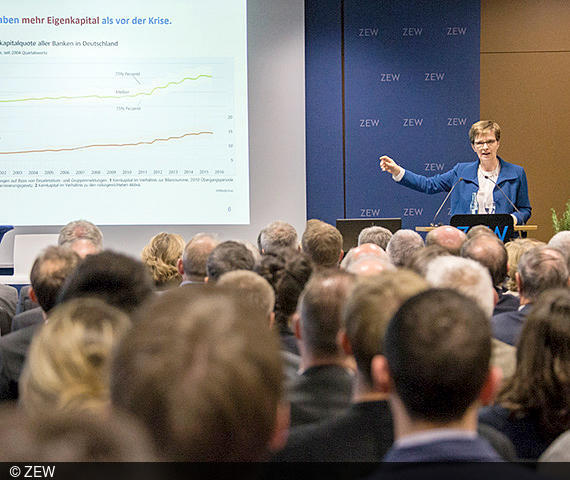First-Hand Information on Economic Policy – “Financial Stability Is a National Responsibility”
Public EventsShortly after the outbreak of the financial crisis in 2007, the G20 agreed on a reform agenda consisting of regulatory measures to protect global financial markets from future crises. At this year’s G20 summit in Hamburg, the heads of state and government endorsed a structured framework for the evaluation of the reforms that have been implemented since 2007. What has become of the G20 reform goals? Are economies today really less likely to experience financial crises? And has it become possible to estimate the costs arising from cyclical fluctuations? Where is the interface between financial stability and monetary policy? These are some of the questions Professor Claudia M. Buch, vice-president of the Deutsche Bundesbank, addressed in her lecture, which took place as part of the “First-Hand Information on Economic Policy” series at the Centre for European Economic Research (ZEW) in Mannheim on 17 October 2017. In her lecture, Claudia Buch argued that although financial stability is a national responsibility, global reforms addressing this issue should always be analysed and assessed on an international level.
The subprime crisis that occurred in the US mortgage market in early 2007, together with the subsequent global financial and economic crisis and the sovereign debt crisis in Europe have brought to light a fundamental issue: How do such crises come about at all and what are their financial repercussions? "Even relatively small economic shocks can have large effects on the entire financial system and the real economy," emphasised Claudia Buch in her lecture entitled "G20 Financial Market Reforms: From Execution to Evaluation". The event attracted around 120 guests, which included representatives from banks and businesses as well as participants from the fields of academia and civil society.
Risk-taking behaviour – and this applies to small and large banks alike – can result in market congestions and ultimately lead to blockages in financial systems, explained Buch. "Crises usually occur when either large financial institutions or many small banks engage in excessive risk-taking behaviour," said Buch. At the same time, financial institutions are closely intertwined. As a result of financial crises, real economic growth slows down, unemployment rates soar and remain at a high level, while debt in the public and private sectors increases.
"We will not be able to prevent crises altogether"
"After the crisis of 2007, we observed a significant rise in public debt in the euro and US dollar areas," said Buch. This is mainly the result of bank rescue measures. "We need to eliminate this mechanism, even if we are not able to prevent crises altogether." For instance, higher buffers are vital instruments against systemic risks. In other words, banks need more equity. This is one of the four core elements of the reform agenda endorsed by the G20 leaders to ensure financial market stability.
In addition to introducing higher equity capital ratios with the aim to make banks and economies more resilient in the face of economic shocks, big financial institutions should be allowed to exit the market and not be "too big to fail". The other two elements of the reform agenda aim to bring about more transparency in the market for derivatives, and strengthen the regulation of the shadow banking system. "Disincentives can encourage large banks to engage in excessive risk-taking," explained Buch. "We learned this the hard way during the economic crisis." So what has been achieved with the G20 financial regulatory reforms?
Banks are holding more equity capital nowadays
According to Professor Buch, a former member of the German Council of Economic Experts, banks are holding more equity capital than they did before the crisis. Calculations conducted by the Deutsche Bundesbank have shown that the equity and core capital ratio of all German banks has increased since 2004. "This development can be observed all across the globe," highlighted Buch. By now, large banks tend to have less unweighted equity and are required to have higher capital buffers, as set out in the Basel III regulations. For standardised, over-the-counter derivatives, policy-makers have introduced a so-called clearing system, a centralised procedure that provides for the mutual settlement of all receivables from and liabilities to banks. Finally, significant improvements have been made with regard to the monitoring of shadow banks. "We have analysed which roles these 'banks' play in the economy," explained Buch. Shadow banks are not banks in the traditional sense, although they provide similar services as financial institutions – which is not necessarily illegal. In Germany, for instance, investment funds form the largest segment of the shadow banking sector, although their economic significance is not very great. "Investment funds are, of course, also subject to regulation," emphasised Buch.
"Global reforms should be assessed in an international context"
Despite considerable advances, there is still a long way to go until all G20 financial market reforms have been fully implemented. Meanwhile, we should continue to assess the implementation of these reforms. According to Buch, it will be necessary to provide a better data foundation and perform these assessments on an independent basis. "We should assess the effects of these reforms from a long-term, macroeconomic perspective, bearing in mind that there are differences between private costs and social returns." In recent times, for instance, low interest rates are increasingly posing a risk to financial stability – a fact that should not be underestimated. This is why the responsibility of ensuring financial market stability should lie with national authorities, concluded Professor Buch. "Global reforms should be assessed in an international context."
The lecture was followed by a lively Q&A session moderated by ZEW President Professor Achim Wambach. The audience contributed a number of interesting comments and questions, such as: What is the role of small banks and are they a potential risk factor for the financial system? Are the Deutsche Bundesbank and the European Central Bank actively and constructively trying to solve the conflict concerning the low interest rate policy? Are national authorities able to assess the development of other economies in terms of their financial stability? Or do we need a European body that can assume this function in the long term? Both the lecture and the subsequent debate have shown that the plan to create stable financial systems remains a complex issue and that there is still need for improvement in a various areas.









